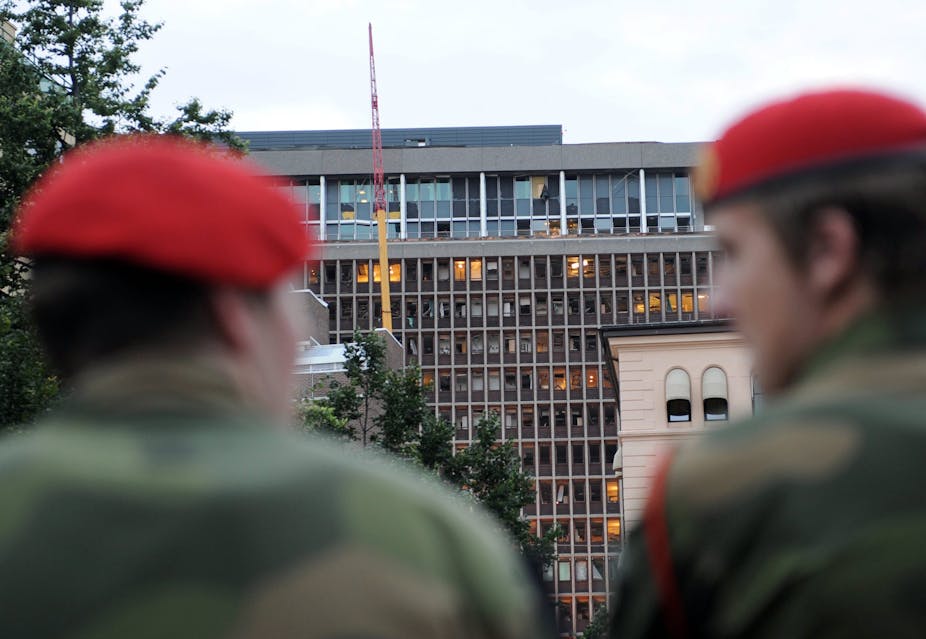The discovery of an Australian link to the horrifying murders of dozens of people by Anders Breivik in Norway has demonstrated the reach of connection in today’s globalised world.
As a result of the ability of a disturbed young man in Oslo to read Australian papers and publications online, our own anti-multicultural ideologues sometimes get caught up in situations not of their own desire.
Before Anders Behring Breivik was arrested as the Oslo killer, he had sent out a manifesto to some 5700 contacts.
The document, grandly titled “2083- A European Declaration of Independence” and circulated under the pseudonym Andrew Berwick, offered a compendium of every extremist White Power fantasies current among such groups.
The central tenet of the argument (summarised in the video of the book) is a simple equation: promoting the saving of Europe through the annihilation of cultural Marxism, multiculturalism, and the Islamic threat.
Cultural Marxism supposedly harbours a relativism that undermines western culture; in support of this view Berwick/Breivik draws on the writings of an anonymous blogger called Fjordman, who quotes British libertarian theorist Roger Scruton, followed by author Dan Brown of Da Vinci Code fame, and then Sydney ex-Marxist and now neo-liberal writer and columnist for The Australian Keith Windschuttle, as evidence for his claim.
He further argues that cultural relativism underpins multiculturalism, which has almost doomed the West as its governments flail against but cannot prevent the influx of Muslims.
Here the quoted armoury of support includes former Liberal Prime Minister John Howard and his Treasurer Peter Costello, as well as Australian Roman Catholic Cardinal George Pell, all hailed as exemplary heroes defending white Christian civilisation from its combined erosion by Marxists and Muslims, presented as a particularly perfidious alliance against which western Christianity has struggled for decades/centuries.
Leaving aside Breivik’s image of himself as the reincarnation of the leader of mediaeval Christian order, the Knights Templar sent to rescue Christendom from its enemies, the litany of White Power fears and aspirations he has systematically assembled contribute to a not-unfamiliar case for exclusion and suppression of non-Christian elements in Western society.
For such people, internal fifth columns made up of Marxist academics and secularist liberals march to the beat of the jihadist drum, destroying their own societies as they engage in the self-delusion of multiculturalism.
Much of the Manifesto comprises clips from the blogs of this “Fjordman”; Fjordman is described in his Wikipedia post as an “anonymous” blogger, who also posts to Atlas Shrugged and Gates of Vienna, well known anti-Muslim and libertarian right-wing sites.
His own site was open for a year in 2005, but has now closed with pointers to many other places he posts. As one reads these many posts and counter-posts (we now have one conspiracy running that Breivik was a possible Mossad agent or drone), the current extent and depth of the European hostility to Islam and Muslims becomes ever more apparent.
While Breivik’s own psycho-pathology may have prompted his specific acts, he was swimming in a sea of hate that bolstered his sense of purpose and justification. Fjordman has posted a denial that he is Breivik, and has distanced himself from the killer’s actions, though not his ideology.
As a critical (erstwhile Marxist) friend of multiculturalism, a liberal, a secularist and an academic (and a Jew, I forgot that one though Breivik surprisedly does not pursue a Protocols of the Elders of Zion conspiracy as part of his tome, and is described elsewhere as a Super Zionist), I have personally experienced many of these critiques.
Unfortunately Breivik is far from isolated in his vision of the approaching Armageddon, nor alone in his world-view about its causes. What Breivik had that these other lesser lights lack, was a sustained energy and discipline that he invested in the construction of his conspiracy view of the world.
He then followed it through with a cruelly and coldly calculated plan of attack, becoming an avenging Angel of his benighted God who touched the lintels of the households and then personally dispatched the first-born within.
His Australian “mini-me” versions can be found all over the place. Some of his paranoias about Muslims can be found in the public utterances of radio shock-jocks and populist newspaper and television commentators, or indeed in the sometimes unrehearsed statements of politicians such as Howard or Costello.
Others lurk on Internet chat sites and blogs railing against Jews, communists, multiculturalists and Muslims, promoting comments that read like out-takes from Mein Kampf. Still others have taken the opportunity of the current Parliamentary inquiry into migration and multiculturalism, to contribute their raves as submissions (see this for example among far too many others in the 482 submissions).
A recent paper by Australian sociologists of Muslim faith canvases “what Australia’s Muslims really think”.
Based on interviews with over 400 Brisbane Muslims at the Eid festival in 2009, the findings indicate strong support for democracy, though low confidence in the Australian media and the Australian government, especially over support for Israel.
Research undertaken by my UTS team for the Australian government, also using 2009 Eid interviews and school interviews of Muslim youth, produces similar outcomes – pointing to a strong moral conservatism but also an alienation from the practices of the political system, though not the values it espouses.
One of the implications for Australia of the Oslo murders will be how Australia’s Muslim communities interpret the events, and the impact on their sense of security and safety; that will depend heavily on Australia’s media and political responses and the lessons taken from those horrific events.
On past history, the prognosis is not great.

